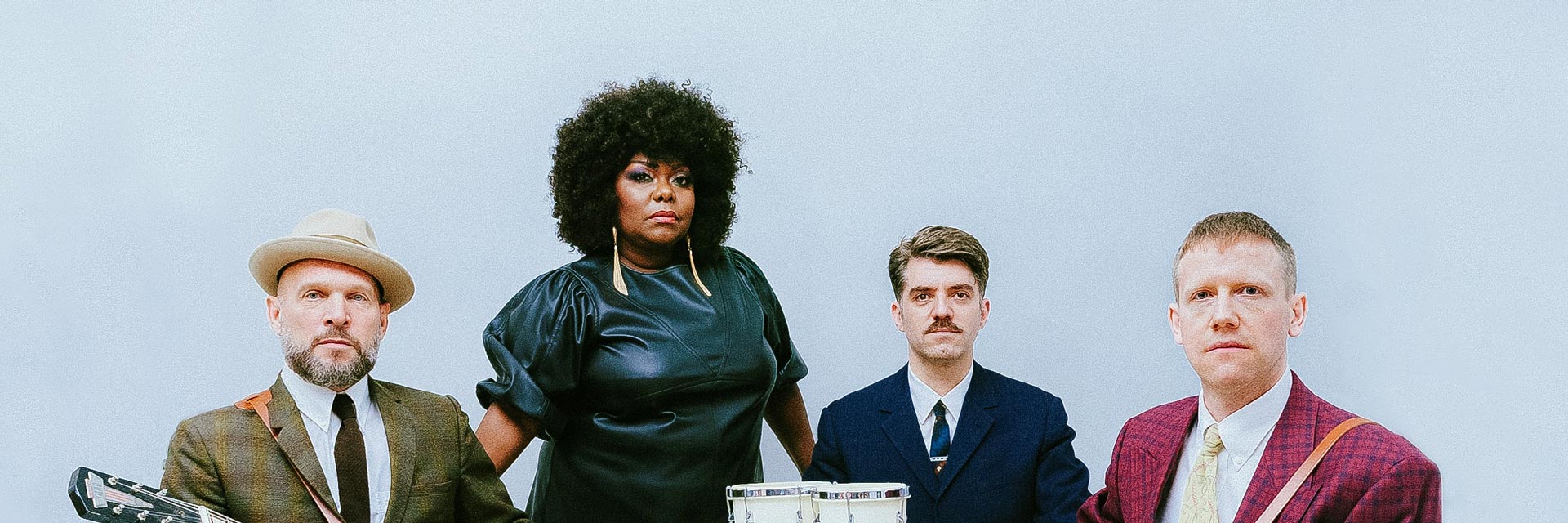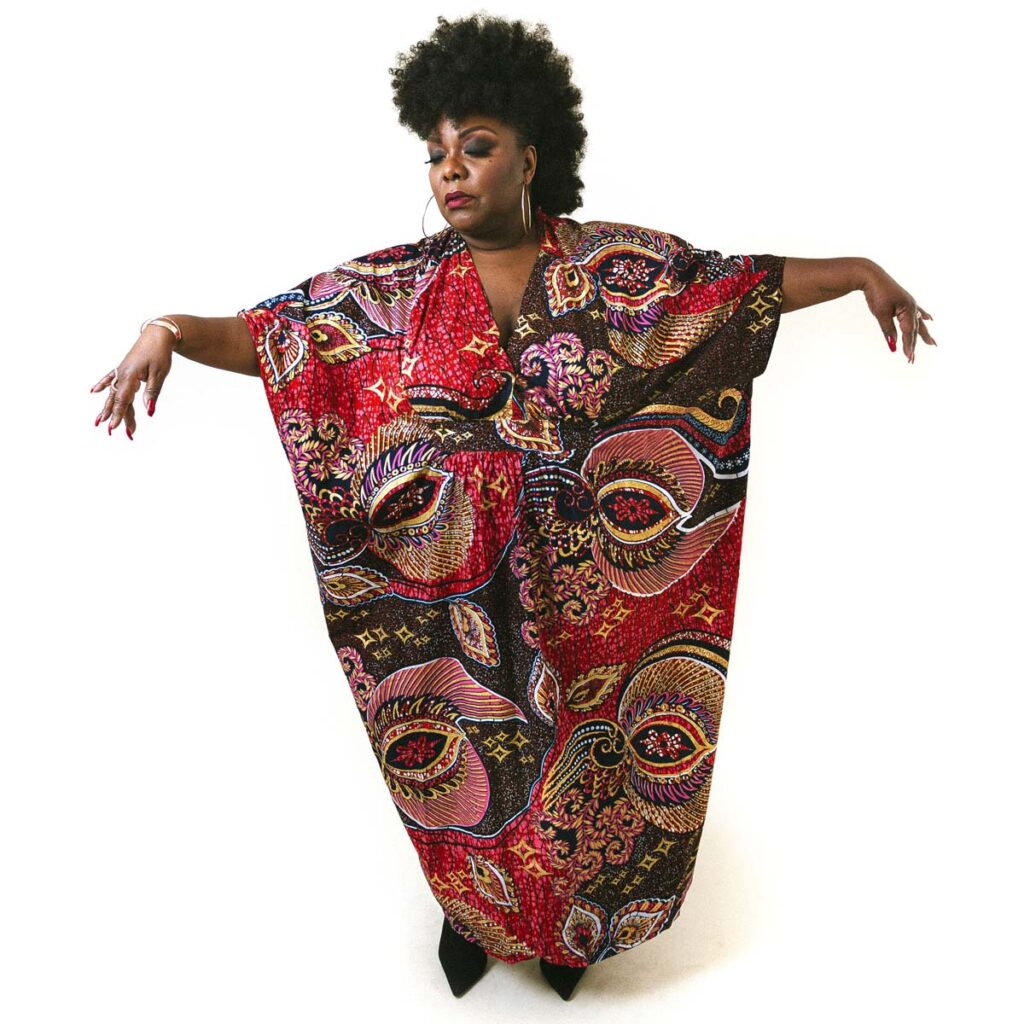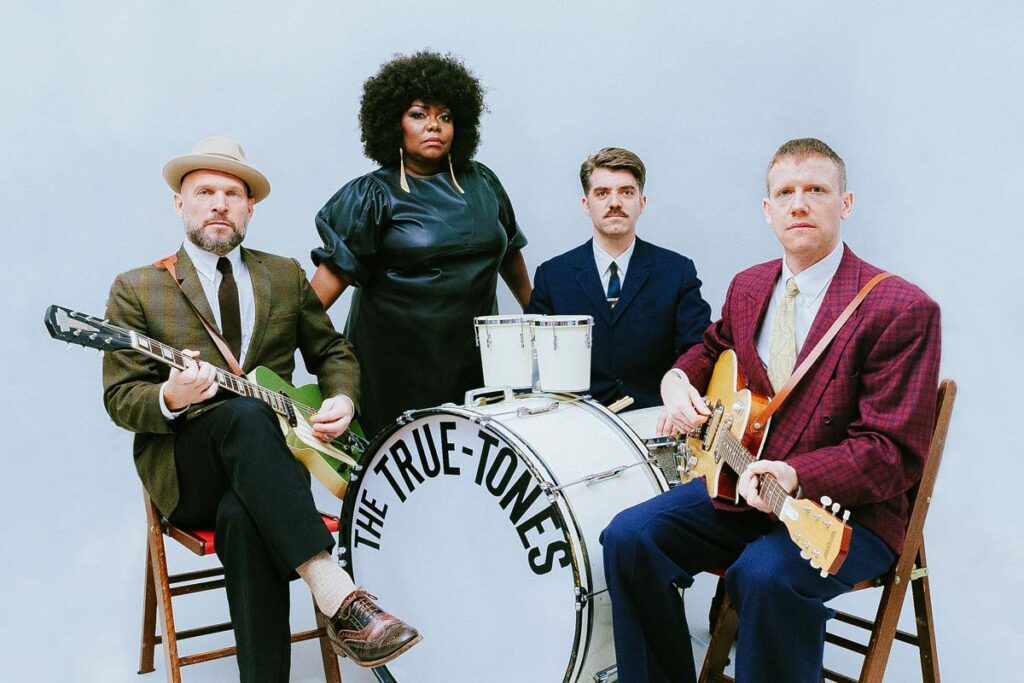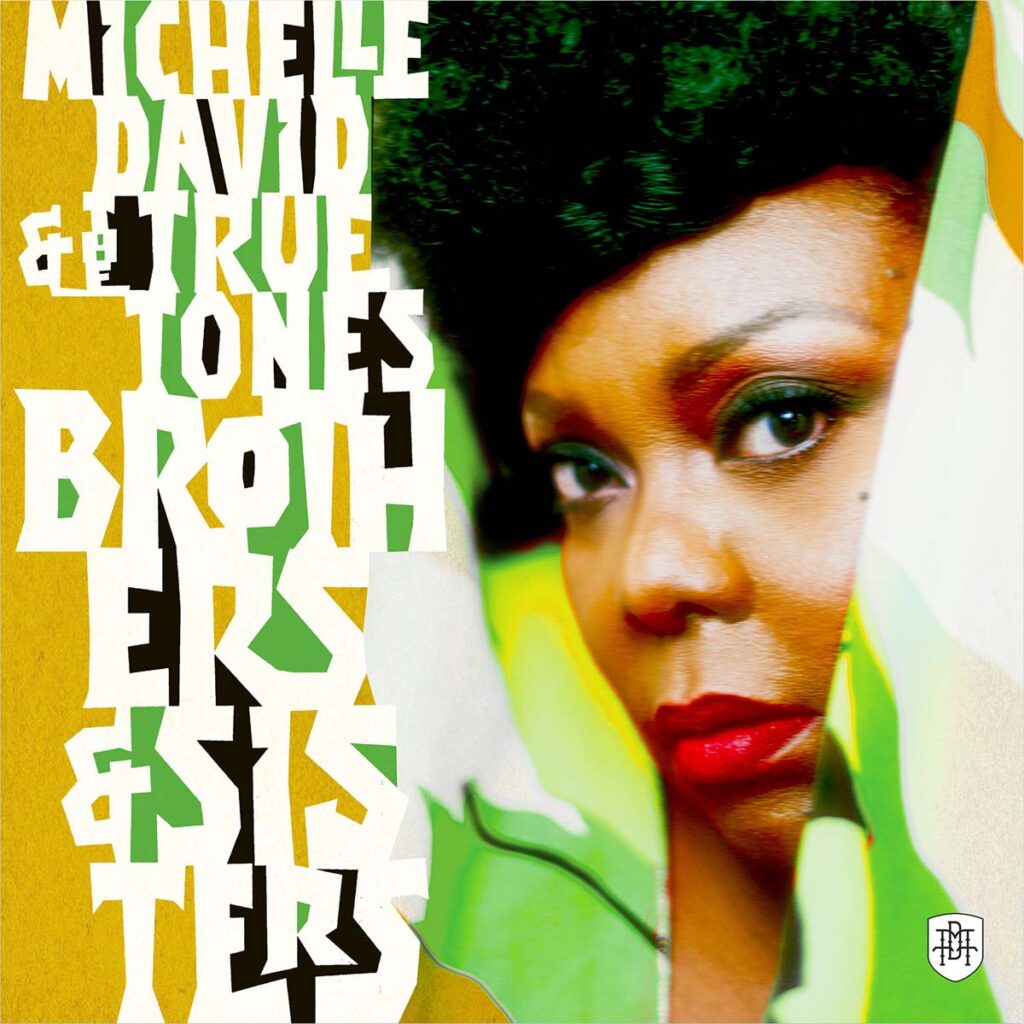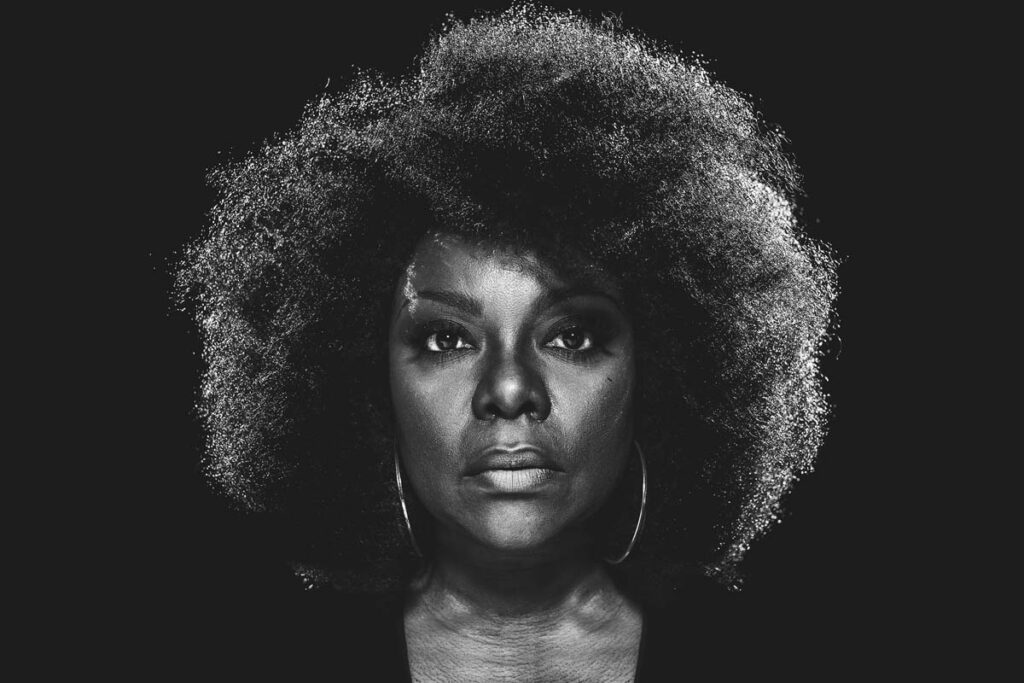Oh Happy Day!
For years, she had been touring the world with major gospel revues, singing the spirituals of Mahalia Jackson. But it is in the Netherlands that American Singer Michelle David has found her home – and her own voice. To mark the release of her new album Brothers & Sisters, the singer explains how she and her band The True-tones transform traditional ecclesiastic pieces into a new sound with modern arrangements and even borrowings from pop.
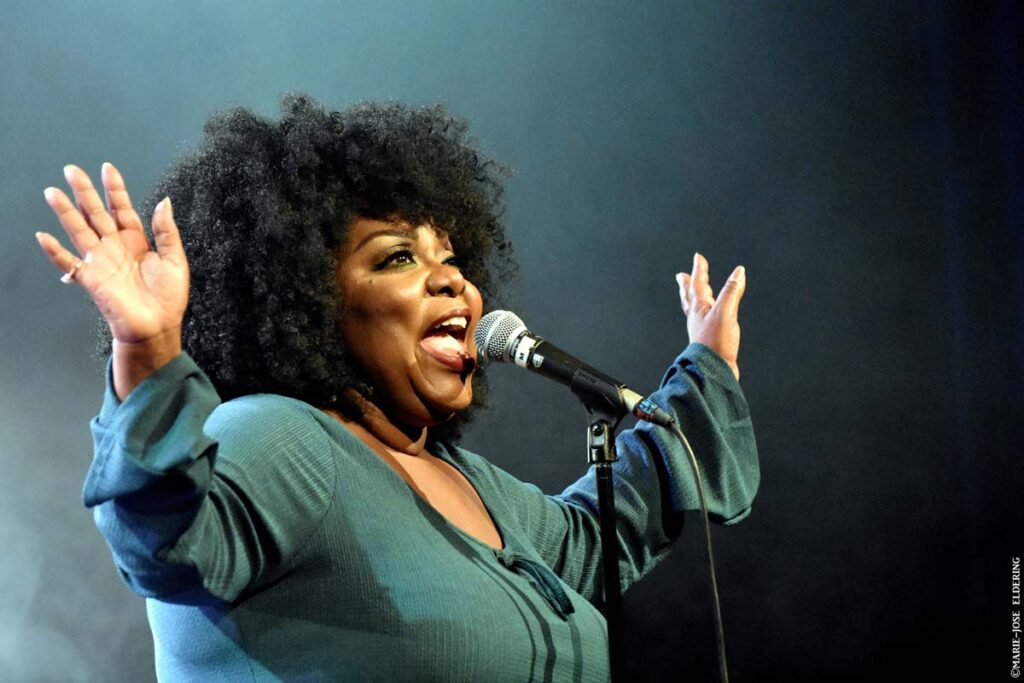
It’s Friday afternoon, the video call starts. Michelle David is sitting in a studio with concert posters on the wall behind her. In a few days, she will be going on tour with her band The True-tones. She’ll be starting in the Netherlands, her adopted country. She has just released her new album, Brothers & Sisters. Another work by the gospel singer with a mighty voice that mixes soul with funk, pop, jazz and, of course, the grooves of heated gospel services. “Alright, let’s go”, calls Michelle David. And off we go.
FIDELITY: Michelle, you once appeared on the morning show of a Dutch TV station. You were shown videos of gospel performances by Mahalia Jackson, The Blind Boys of Alabama and the Kurt Carr Singers. You couldn’t sit still and grooved on the sofa …
Michelle David: (laughs out loud) Yes, I just can’t help it. Even as a child, I was constantly surrounded by music. There was always some kind of record playing at home, gospel, blues, jazz, pop … My aunt, who I grew up with, had a vibrant collection. But above all, gospel was the music of my youth. I was in church half the week. On Sundays, every Wednesday. And usually on Saturdays too, when we practiced and cooked for the neighborhood. I just can’t sit still when good music is playing. Especially with the Kurt Carr Singers.
I have to admit, I didn’t even know the group.
One of my favorite musicians, Kurt Carr. A role model. His arrangements, his ear for exceptional singers. I interviewed him once years ago at a gospel festival in the Netherlands. I had my own little TV program at the time. But at the concert, Carr invited me on stage and let me sing a song. That was a great moment.
I see I can learn from you: what do you ask a famous gospel artist?
Oh, now you’ve got me, Mr. Colleague (laughs uproariously). That was ten or twelve years ago. I only remember one thing: we laughed, and we laughed a lot!
I have the feeling we’re on the right track … (laughs)
Oh wait, that’s right, he then asked me if I was the Oprah Winfrey of the Netherlands. That had me rolling in the aisles.
Oprah is legendary as a talk queen. But her gospel qualities …
(laughs)
You went from being the Oprah to the Mahalia of the Netherlands.
Mahalia Jackson? (laughs) Excuse me, that’s too much. But thank you for the compliment. Mahalia was a unique artist. But in a way, we are also pioneers of the gospel.
In what way?
We interpret gospel in a way that not many bands do. We are open to all kinds of inspirations. Pop, jazz, hip-hop. My first LP as a child was by the Sugarhill Gang, rap music. But in church and on gospel tours I’ve sung “Oh Happy Day” often enough for this life.
Your first four albums, Michelle David & The Gospel Sessions Vol. 1-4, were inspired by folk and funk. The new work Brothers & Sisters is very soulful, with influences of rock’n’roll and even afro-beat. Is this still a gospel album?
The lyrics are still classic gospel – but in a fresh outfit. We are moving into very contemporary soundscapes.
“Oh Happy Day”, reloaded?
Well said. Yes, the trend comes from America. Young bands are reinterpreting traditional songs and playing gospel dance, gospel rap or gospel R’n’B. We are almost unique in Europe.
What do you call your style?
I would call it “inspired gospel”. The world keeps turning. The priests in the church have to deal with new realities. And so does gospel music. Brothers & Sisters is something like a mirror of the world for me. So much is happening that I, as an artist, can’t look away. People suffer, people die. I’m not an activist. But I raise my voice. I sing about the world we want for our children. And that is not a world in which a generation of traumatized children is growing up.
How difficult is it to find your own voice after decades in well-oiled gospel revues? Your own sound?
I am a professional. In a Mahalia show, I sound like Mahalia, in a Motown musical I sound like Diana Ross. That’s how my voice is trained. But I can also let it loose. Then I sound like Michelle. The first time I got together with the guys in my current band in the practice room, I warned them. I am loud. That’s too much for some artists. But the guys were really relaxed. They even teased qualities out of my voice that I didn’t know.
For example?
My voice gets kind of raspy after I’ve sung a few songs with full energy. I usually take a break then. But my guys were like, “More of that. A lot more of it!”
But I also read that the band tied you to a chair in the studio to slow you down …
Almost … (laughs) I sang standing up for decades. Now I suddenly had to sit down. ‘I can’t do that’, I explained, ‘then I won’t sound good’. ‘Easy, it’ll be fine,’ said Onno, my guitarist. And that’s how it was. I even had to lean forward to reduce my sound volume even further. That’s how I sang almost the whole album. This makes the songs sound very intimate.
Any singing teacher would say: That’s not how you do it.
Probably. But when I sing, I’m overcome with emotion and I really get into it. That doesn’t suit every song.
Let’s take a look at some of the songs on Brothers & Sisters, like the title track. A groovy soul piece that seems to be inspired by Curtis Mayfield. I also hear a hint of Diana Ross Motown.
It’s not the first time I’ve heard that. I can’t detect any Diana Ross in my throat myself. But that happens quite often: people come up to me and have this or that association. I can’t always make sense of it.
Maybe it’s also because you were once in the studio with Diana Ross herself. I guess you can’t completely free yourself from your past.
Well, you’re probably right.
“That Is You” surprised me: almost a pop song, in the style of Level 42 or Maroon Five …
Yes, we explored the pop qualities of soul. But without a plan. We jammed, we approached it, we let the song develop.
In “If You Don’t Try” you play rock’n’roll – and sing like James Brown in his best days. A great song, I have to say.
Thank you! Yes, I like it too. The rhythm is rock’n’roll, the feeling is funk. And Michelle is on it at the end. (laughs)
There are horns on Brothers & Sisters. On the album before that, Truth & Soul, it was strings. You don’t really want to commit to a typical band sound, do you?
Are strings or winds the deciding factor?
I think they contribute to whether you sound rather sweet or rather funky.
But that comes naturally. During one of our few songwriting sessions for Brothers & Sisters, we knew immediately that we had to add horns here and there. Which instruments should contribute what sound in which places as a song develops is not a conscious strategy along the lines of: last time we had violins, now let’s crack out the trombones.
Isn’t it a crucial difference to preach and sing in a studio with a red recording light rather than in a packed church? The sound space alone is completely different.
Of course. The biggest difference is: It’s loud in the church. Really loud! You have to sing against that. The conditions in the studio are completely different. But I’m the same. And when I start singing, telling my stories, and I’m not tied to a chair (laughs), then I can put myself in a church situation. But to be honest: It’s live where I’m at my best. Those are the moments when the magic happens.
You grew up in New York and attended the famous High School of Music and Art, familiar to many people from the movie Fame. Did you also jam in the cafeteria and on the street during rush hour?
Yes, that’s what it was like. The school is a melting pot of the most diverse people, the arts and genres mingled. Things often got heated, even on the street. The only difference to the movie was that we didn’t climb onto the cars. I never sang from the roof of a cab.
MICHELLE DAVID
Michelle David grew up in New York in the late sixties and early seventies. She began singing in a gospel church choir at the age of four. After training as a medical-technical assistant, she toured the world with various gospel choirs and appeared in successful theater shows such as The Sound of Motown, Glory of Gospel and Mahalia and was in the studio with Diana Ross. She now lives in the Netherlands, where she has already released six albums with her band The True-tones (guitarist Paul Willemsen, bassist Onno Smit and drummer Bas Bouma). The latest album Brothers & Sisters, was released recently. Michelle David, 57, is the mother of four grown-up children.
www.michelledavidandthetruetones.com

